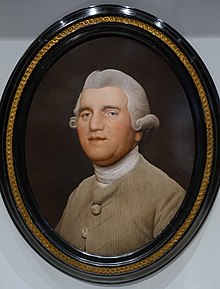Josiah Wedgwood | |
|---|---|
 Josiah Wedgwood by George Stubbs, 1780, enamel on a Wedgwood ceramic tablet | |
| Born | 12 July 1730 Burslem, Staffordshire, England |
| Died | 3 January 1795 (aged 64) Etruria, Staffordshire, England |
| Resting place | Stoke Minster |
| Occupation(s) | Potter, entrepreneur |
| Known for | Founding Wedgwood, devising a number of sales methods |
Josiah Wedgwood FRS (12 July 1730 – 3 January 1795)[1] was an English potter, entrepreneur and abolitionist. Founding the Wedgwood company in 1759, he developed improved pottery bodies by systematic experimentation, and was the leader in the industrialisation of the manufacture of European pottery.[2]
The renewed classical enthusiasms of the late 1760s and early 1770s were of major importance to his sales promotion.[3] His expensive goods were in much demand from the upper classes, while he used emulation effects to market cheaper sets to the rest of society.[4] Every new invention that Wedgwood produced – green glaze, creamware, black basalt, and jasperware – was quickly copied.[5] Having once achieved efficiency in production, he obtained efficiencies in sales and distribution.[6] His showrooms in London gave the public the chance to see his complete range of tableware.[7]
Wedgwood's company never made porcelain during his lifetime, but specialised in fine earthenwares and stonewares that had many of the same qualities, but were considerably cheaper. He made great efforts to keep the designs of his wares in tune with current fashion. He was an early adopter of transfer printing which gave similar effects to hand-painting for a far lower cost. Meeting the demands of the consumer revolution that helped drive the Industrial Revolution in Britain, Wedgwood is credited as a pioneer of modern marketing.[8] He pioneered direct mail, money-back guarantees, self-service, free delivery, buy one get one free, and illustrated catalogues.[9][10]
A prominent abolitionist fighting slavery, Wedgwood is remembered too for his Am I Not a Man And a Brother? anti-slavery medallion, which had been commissioned by Joseph Hooper, a founder of the Society for Effecting the Abolition of the Slave Trade. The medallion used the design from that society.
Wedgwood was a member of the Darwin–Wedgwood family, and he was the grandfather of Charles and Emma Darwin.
- ^ Church, Arthur Herbert (1899). . In Lee, Sidney (ed.). Dictionary of National Biography. Vol. 60. London: Smith, Elder & Co.
- ^ Ashton, T. S. (1948). The Industrial Revolution 1760–1830, p. 81
- ^ McKendrick 1982, p. 113
- ^ McKendrick 1982, p. 105.
- ^ McKendrick 1982, p. 107.
- ^ McKendrick 1982, p. 108.
- ^ Rendell, Mike (2015). "The Georgians in 100 Facts". p. 40. Amberley Publishing Limited
- ^ "Why the Industrial Revolution Happened Here". BBC. 11 January 2017.
- ^ Cite error: The named reference
Marketingwas invoked but never defined (see the help page). - ^ Cite error: The named reference
Smith Institutewas invoked but never defined (see the help page).